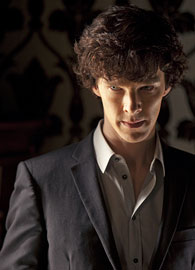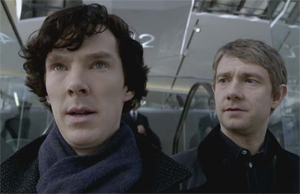Sherlock (2010, Produced by Steven Moffat and Mark Gatiss):
Much like James Bond, Sherlock Holmes is a cultural figure that has outgrown his literary origins, to the point where the trappings have usurped the actual character — the foggy nocturnal streets of London, the calabash pipe, the dastardly villains, dear Watson (sometimes goofy, sometimes stolid, always second banana) handy with a revolver and unstinting loyalty… and need we even mention the word “elementary”? Yet like Bond, Holmes has been a pliable figure, veering from outright slapstick (Sherlock Holmes’ Smarter Brother (1975)) to faithfully solemn recreations of Arthur Conan Doyle’s period and mood (the estimable Jeremy Brett television series in the 80s). Oftentimes Sherlock has been brought into our contemporary era, with mixed results: we look back with fond memories on Basil Rathbone’s Scarlet Claw (1944), which was set in the marshes of present-day Canada but might as well have taken place a half-century earlier, while we barely remember the sight of Rathbone aiding the American allies against those ghastly Nazis in Sherlock Holmes Goes to Washington (1942). And then there’s pastiches like Guy Ritchie’s Sherlock Holmes (2009), which presented its protagonist as a glib, anachronistic genius who could figure things out with a exaggerated Matrix-style whip of the camera.
 So here comes another reinvention of the Holmes legend, courtesy of Steven Moffat and Mark Gatiss, the producer/writer team who have contributed to the recent reinvigoration of Doctor Who. Canny to the end, they know what makes today’s audiences tick: a troubled hero, plenty of dishy actors and settings, a slickness of pace and production. Moving a beloved character into the modern day is always a dicey proposition, but the producers (who also wrote two of the three episodes in the series so far) include sly little nods to the original source (a “three-pipe” problem is now a “three-patch” problem — nicotine patches, that is). Black cabs have replaced hansoms and cell phone texts have taken the place of hastily scrawled messages, and yet the irreducible heart of the Holmes myth remains: brilliant consulting detective, steadfast doctor friend and chronicler, clueless police, dastardly crimes. Give Moffat and Gatiss credit, they certainly know their Sherlock. Maybe a little too much — the series’ three episodes contain a couple dozen plot references to individual Conan Doyle tales, which is certainly manna to Holmes buffs, but a little scattershot when it comes to cogent narrative.
So here comes another reinvention of the Holmes legend, courtesy of Steven Moffat and Mark Gatiss, the producer/writer team who have contributed to the recent reinvigoration of Doctor Who. Canny to the end, they know what makes today’s audiences tick: a troubled hero, plenty of dishy actors and settings, a slickness of pace and production. Moving a beloved character into the modern day is always a dicey proposition, but the producers (who also wrote two of the three episodes in the series so far) include sly little nods to the original source (a “three-pipe” problem is now a “three-patch” problem — nicotine patches, that is). Black cabs have replaced hansoms and cell phone texts have taken the place of hastily scrawled messages, and yet the irreducible heart of the Holmes myth remains: brilliant consulting detective, steadfast doctor friend and chronicler, clueless police, dastardly crimes. Give Moffat and Gatiss credit, they certainly know their Sherlock. Maybe a little too much — the series’ three episodes contain a couple dozen plot references to individual Conan Doyle tales, which is certainly manna to Holmes buffs, but a little scattershot when it comes to cogent narrative.
Fortunately, Moffat and Gatiss realize, as did Doyle, that what counts are not so much the tales themselves as the characters who inhabit them. As a colder, more digitally connected and socially withdrawn Holmes, Benedict Cumberbatch is inspired casting. Disdain has always been one of Holmes’s primary colors: it peeked through in Rathbone’s snappy delivery, and burst out in fits and starts in Brett’s more manic-depressive performance. Tall and fine-boned, Cumberbatch wisely hoes his own row by dropping his voice to a diffident purr — to him, deductions and derision are all the same, and they all emerge at the same breakneck speed. Yet in our self-confessional, anguished age, there is something touching about his Holmes’ stubborn adherence to facts and observations, his unwillingness and inability to engage with the people around him. Far better at delineating someone’s past history or motives than he is at interpreting a new friend’s cryptic remark about his own undetermined sexuality, Cumberbatch nails Holmes as the ultimate egghead, never happier than when he’s inside the minds of the killers and victims he tracks.
 Martin Freeman makes for an amusing foil as Watson — not quite convincing as the haunted Army vet who was wounded in Afghanistan, he nevertheless brings a watchful humanity to the proceedings, along with a dash of the cheeky humor he’s known for in projects like The Hitchhiker’s Guide to the Galaxy and Office Space. His interactions with Holmes are less buddy-buddy than Odd Couple: the master detective is too busy casting scorn on human emotions and stupidity to really take the time to build camaraderie with his new flatmate. In a decidedly postmodern twist, Freeman’s Watson may be more an enabler than a comrade, but he and Cumberbatch nevertheless enjoy the peppy repartee (which is often poked fun at as a possible sign of gay love — you certainly can’t tackle Holmes in the twenty-first century without a certain amount of nudge-nudge, wink-wink) that is essential in any representation of the Holmes-Watson partnership. Likewise, the modern London setting might take a little getting used to; we’re no longer in the land of poverty-stricken alleyways or mist-shrouded moors, but the faceless, glittering streets and sharply angled skyscrapers have an atmospheric menace all their own.
Martin Freeman makes for an amusing foil as Watson — not quite convincing as the haunted Army vet who was wounded in Afghanistan, he nevertheless brings a watchful humanity to the proceedings, along with a dash of the cheeky humor he’s known for in projects like The Hitchhiker’s Guide to the Galaxy and Office Space. His interactions with Holmes are less buddy-buddy than Odd Couple: the master detective is too busy casting scorn on human emotions and stupidity to really take the time to build camaraderie with his new flatmate. In a decidedly postmodern twist, Freeman’s Watson may be more an enabler than a comrade, but he and Cumberbatch nevertheless enjoy the peppy repartee (which is often poked fun at as a possible sign of gay love — you certainly can’t tackle Holmes in the twenty-first century without a certain amount of nudge-nudge, wink-wink) that is essential in any representation of the Holmes-Watson partnership. Likewise, the modern London setting might take a little getting used to; we’re no longer in the land of poverty-stricken alleyways or mist-shrouded moors, but the faceless, glittering streets and sharply angled skyscrapers have an atmospheric menace all their own.
“I’m not a psychopath, I’m a high–functioning sociopath; do your research.”
— Benedict Cumberbatch, Sherlock
 “A Study in Pink” gets the series off to a fine start, with a sterling appearance by Philip Davis as the unlikely villain of the piece. “The Blind Banker” is unfortunately a step down in all departments, resorting to perils-of-Pauline predicaments and Fu Manchu stereotypes that were hoary fifty years ago and now seem hopelessly out-of-date amid the zippy modern settings and cinematography (tellingly, it’s the one episode neither Gatiss or Moffat wrote). The final cliffhanger episode “The Great Game” shows off the strengths and weaknesses of the series all at once. As Sherlock races against time to stop a mad bomber, his intuitive skills placed in a thoroughly modern context, the story is riveting, but Moffat and Gatiss are a bit too eager to please the current Zeitgeist, and the reveal of Professor Moriarty (Andrew Scott), Holmes’s archnemesis, comes off as an outtake from Dark Knight, with Moriarty cackling and pontificating on the random nature of evil like a Joker without the clown makeup and facial scars. (Need we mention that the Napoleon of Crime finds Holmes rather sexy?) Still, it’s a fine tightrope to walk when you’re trying to be faithful and topical at the same time, and for the most part Moffat and Gatiss negotiate that line with finesse. With more Holmes episodes on the way, one hopes they continue that trend, and maintain their trust in the original material — it’s certainly served a horde of interpreters well in the past.
“A Study in Pink” gets the series off to a fine start, with a sterling appearance by Philip Davis as the unlikely villain of the piece. “The Blind Banker” is unfortunately a step down in all departments, resorting to perils-of-Pauline predicaments and Fu Manchu stereotypes that were hoary fifty years ago and now seem hopelessly out-of-date amid the zippy modern settings and cinematography (tellingly, it’s the one episode neither Gatiss or Moffat wrote). The final cliffhanger episode “The Great Game” shows off the strengths and weaknesses of the series all at once. As Sherlock races against time to stop a mad bomber, his intuitive skills placed in a thoroughly modern context, the story is riveting, but Moffat and Gatiss are a bit too eager to please the current Zeitgeist, and the reveal of Professor Moriarty (Andrew Scott), Holmes’s archnemesis, comes off as an outtake from Dark Knight, with Moriarty cackling and pontificating on the random nature of evil like a Joker without the clown makeup and facial scars. (Need we mention that the Napoleon of Crime finds Holmes rather sexy?) Still, it’s a fine tightrope to walk when you’re trying to be faithful and topical at the same time, and for the most part Moffat and Gatiss negotiate that line with finesse. With more Holmes episodes on the way, one hopes they continue that trend, and maintain their trust in the original material — it’s certainly served a horde of interpreters well in the past.




